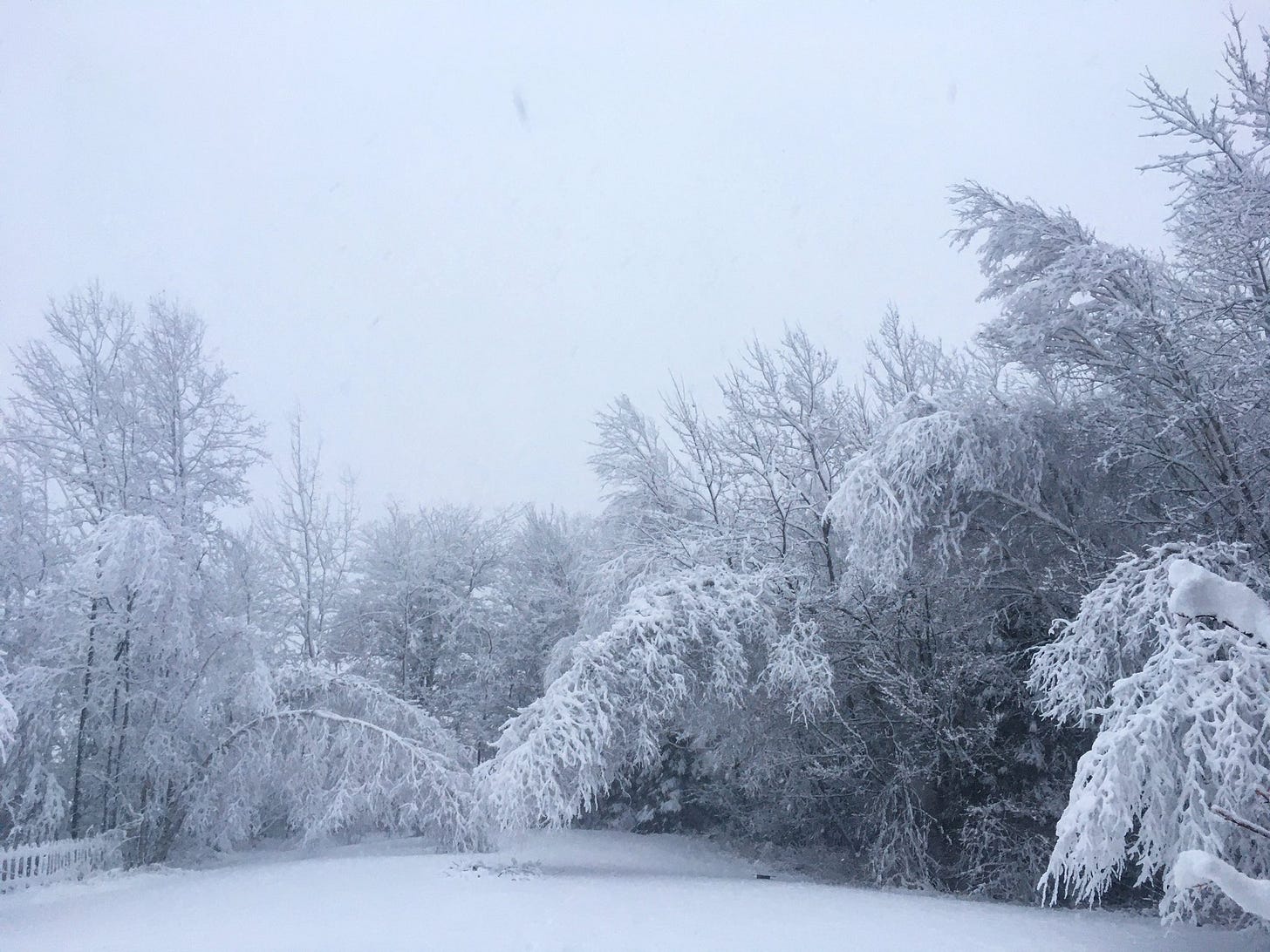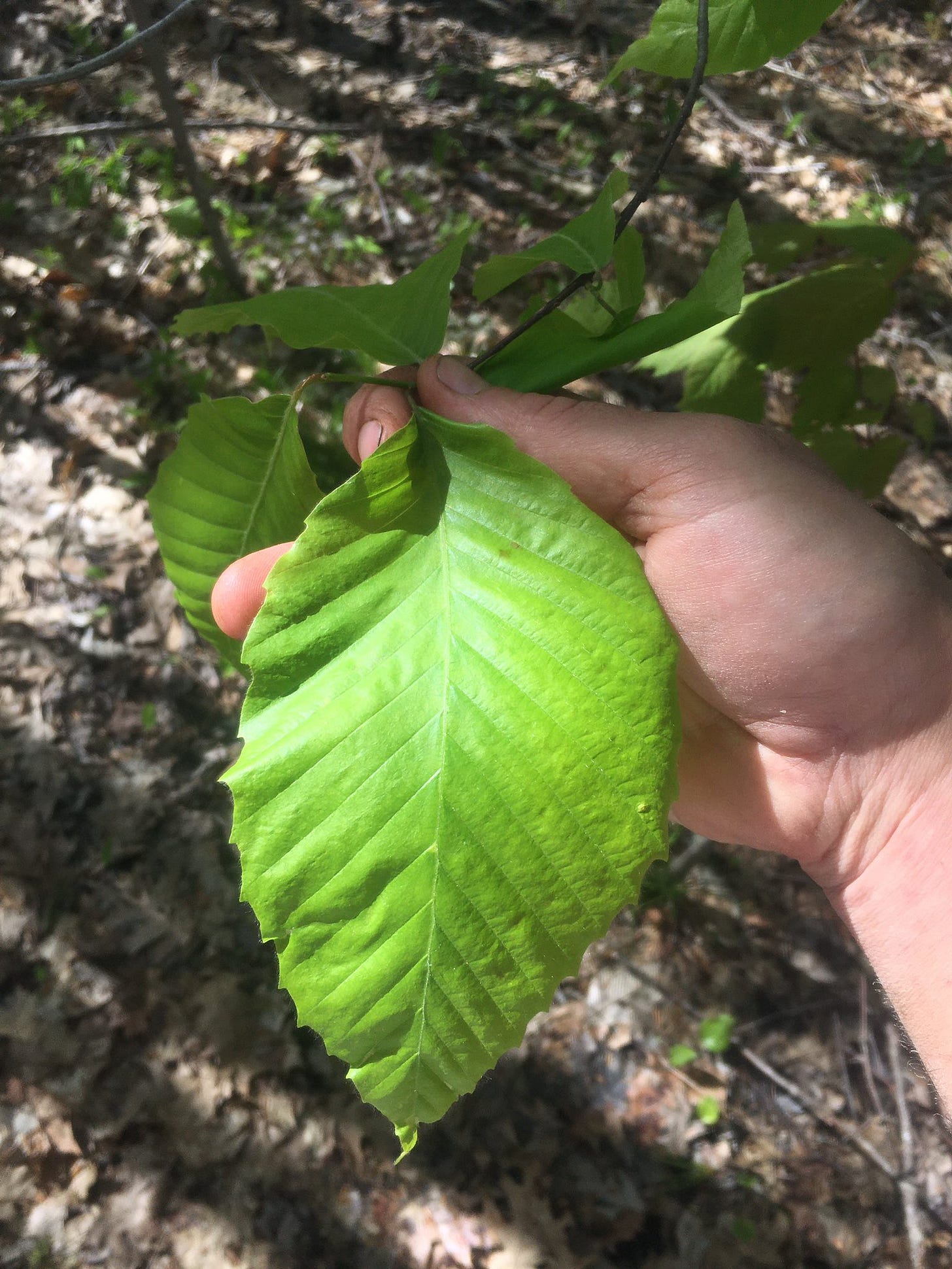On Gurney Hill: Life’s a Beech
At first, the blizzard came as a welcome distraction. After weeks of sickness and fear set against the gray of late, late winter, the fat flakes did their trick of quickly turning the world beautiful, everything coated in thick poofs of snow. Staring out of the kitchen window, I watched the trees that ring the front lawn of our cabin bow under the weight. In a matter of hours, the heavy snow turned a handful of birches and poplars into inverted Us, tree tops touching the ground. More than half a foot of tree-bending snow fell on the top of Gurney Hill — snow that snapped trees elsewhere, knocking the power out for days. It was April 10, 2020; third winter had arrived in Maine.
Being plunged back into the 19th century can be somewhat enjoyable under the right circumstances. There’s a spring nearby, and it’s a small thrill to go there for water; there’s usually a stash of candles under the sink , and while melting snow to flush the toilet isn’t exactly convenient, it’s never not interesting. These were not the right circumstances. Just think back to how many times a day you were washing your hands in early April; now imagine being without running water for a few days. There was already a vase of withered daffodils sitting on the kitchen counter back in New York, cut from the backyard before any of this felt like it was going to be real. Spring was supposed to have arrived already, even if it was the worst possible spring. But during those pitch dark nights in the snow-covered house, it felt like I lived a full winter, with all of the grim, quiet desperation packed into just a handful of days in mid-April.
The snow melted as quickly as it fell, and the power eventually turned back on too, with the well pump along with it. I could once again wash my hands raw. But things still looked and felt grim until the beeches started to leaf.
Bright, saturated, Kelly green, nestled together in little soft-looking clusters of three, baby beech leaves are one of the first signs of spring in the canopy of the Maine woods. Looking out at the face of a forested mountain, they appear like a vivid haze spread across the grey. I’ve noted that first pop of color in the past, and how it always feels impossibly late, but never paid much attention to the individual leaves. This past spring, I couldn’t get enough of them—the slightly serrated edge, the almost downy appearance of the just-unfurled leaves, the green green green green green.
In late summer, back in Brooklyn, one thing that helped keep me sane was going on long walks through Bed-Stuy at night, with both a beer and my dog in tow. I got to be outside, to be by myself, to get lightly buzzed off of a fancy tall boy from the neighborhood wine bar, to peer into block after block of brownstone windows. It was a perfect interlude from work and parenting and the drudgery of continual quarantine — something I wouldn’t mind doing even if and when things like “being in public” are safe once again.
Walking to the wine bar one night, I stopped on a quiet stretch of Halsey street because Daisy stopped to go to the bathroom. After picking up after her, I stood up to find a guy standing in front of me, mumbling something through a surgical mask. “Excuse me?” I said. And then I very clearly heard a second person who had walked up behind me say, “I’m going to need to see your wallet.”
Getting robbed during a pandemic is a surprisingly safe social interaction, at least from an epidemiological standpoint. We all wore masks, we all stood relatively far apart. For once, the virus wasn’t the worry. The gun, which I only saw for a second — a shirt quickly lifted, the butt sticking out or a waistband — was the big, scary thing hanging over the moment.
I dug out my wallet and handed over my very broken phone, swearing to myself more than anyone. “You have got to be fucking kidding me,” I said, pulling out my bank card. “Can’t catch a fucking break,” one of the guys said back in what sounded like genuine commiseration, like he wasn’t doing this to me, or that it wasn’t about me in particular. They gave back my phone and wallet, but kept my debit card. I gave them the pin; again, the gun.
I was briefly out $400, which was withdrawn from a bodega ATM by the time I got back home. My card was closed, a police report was filed (Cop: “Could you ID who robbed you?” Me: “They were both wearing masks.”), the money was quickly refunded. It was almost like it didn’t happen, but it did. The biggest change was that I stopped going on my walks. The last thing I wanted was to go through it again, to have it turn out worse the second time around.
At first that meant not going out at night at all, then it meant going out but only with a bit of cash and leaving my wallet at home. Or going out but not walking down the same stretch of Halsey, or going out and walking down Halsey but only on the other side of the street. Or going out and walking down the same side of the street but only walking home, moving in the opposite direction than when I was robbed. Did any of it make a difference? Did any of it protect me? Make me more vulnerable?
Did it happen because the block was dark? Because I actually picked up my dog’s shit? Was it because I didn’t wash my hand often enough? Or went into work for one extra day after thinking, huh, I probably shouldn’t be doing this anymore. Because I went to Trader Joe’s that one extra time to stock up? Should I have already been wearing a mask, even though in early March everyone you’re supposed to listen to was saying no, you don’t need to wear a mask? What could I have done, should have done?
More so than even the oaks, beech leaves cling. They’re still there, large and brittle, hanging daintily like ornaments, narrow tips pointed straight downward. Right now, as I write, they’re out there rattling in the wind of another blizzard. It's hard to catch them in between, really: fully denuded at the tail end of winter, all smooth grey bark and branches, before exploding again into green.



